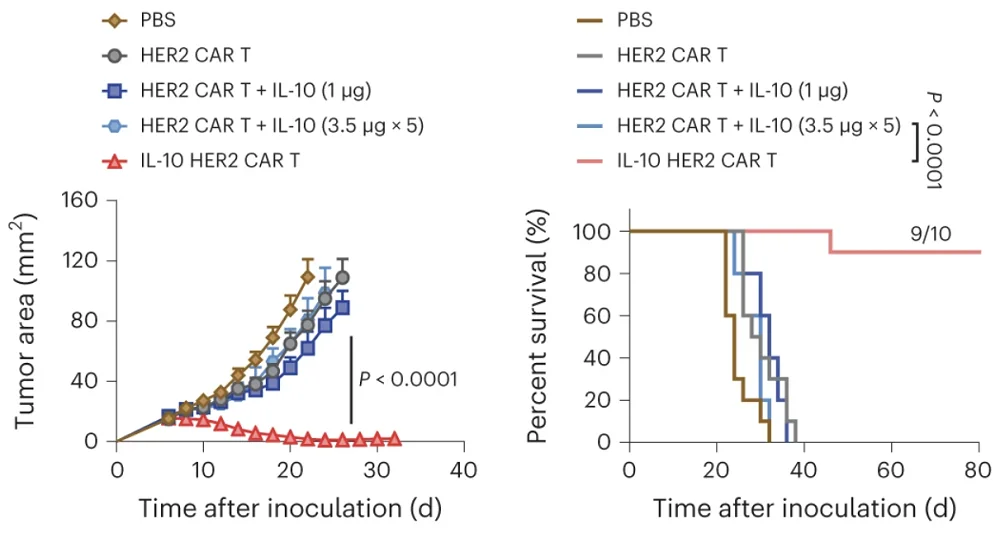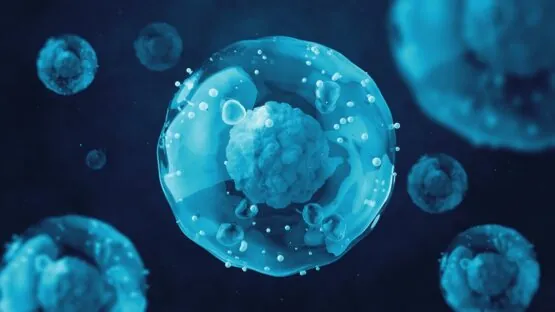Scientists have created improved CAR T cells that also express the cytokine IL-10. The new cells proved highly effective in mice and in a pilot human trial [1].
The promise and the limitations
Chimeric antigen receptor (CAR) T cells are among the most promising treatments in oncology. To create them, immune T cells are genetically modified to express receptors they normally don’t have for specific antigens found in various types of cancer. Those receptors increase the T cells’ ability to locate and attack cancer cells. CAR T cells have been found effective against blood cancers, but their record with solid tumors is less impressive [2]. It is thought that tumor microenvironment (TME), where a lot of cancer cells are tightly packed together, quickly exhausts T cells.
Scientists have been searching for ways to buttress CAR T cells’ survivability and aggressiveness. In this new study, the researchers report creating “armored” CAR T cells that not only express CARs but also produce a lot of the anti-inflammatory cytokine IL-10, and the results speak for themselves.
More proliferation, less exhaustion
The CAR T cells the researchers first produced target human epidermal growth factor receptor 2 (HER2), which is often abundant in colorectal cancer and inversely correlates with survival. ‘Regular’ HER2 CAR T cells, intravenously injected into a mouse model of HER2-expressing colon adenocarcinoma, quickly wither in the TME, failing to control established, solid tumors. IL-10-expressing HER2 CAR T cells, on the other hand, demonstrated several-fold stronger proliferation, less exhaustion, and enhanced cytotoxicity. Similar results were achieved in mouse models of human pancreatic cancer and lymphoma.
Interestingly, the higher the CAR density on the cells’ surfaces was, the more prominent of a protective effect IL-10 seemed to have. The researchers hypothesized that T cells’ exhaustion is dependent on the interaction of CARs with the antigens on the cancer cells’ surface: the more interactions, the quicker the T cell gets exhausted if it’s not protected by IL-10 secretion.
Improved mitochondrial fitness
Previous research has shown that T cell exhaustion happens in large part due to impaired mitochondrial fitness [3]. Consistent with this idea, CAR T cells with dysfunctional mitochondria were more abundant in tumors than in the spleen. IL-10 expression rescued mitochondria fitness in tumor-infiltrating CAR-T cells. The percentage of dysfunctional mitochondria in IL-10 CAR T cells was just 5.5% compared to 23% in regular CAR T cells.
Intravenous injection of IL-10 HER2 CAR T cells caused complete tumor regression in 90% of treated mice. Conversely, treatment with regular CAR T cells produced only transient control over tumor growth. The researchers tried adding IL-10 to the injection, but this did not work either. It seems that IL-10 must be secreted by the T cells in order to help them survive the encounter with the tumor.

The researchers then created IL-10 CAR T cells against several other types of cancer, largely with similar results. In particular, the treatment worked spectacularly against a metastatic model of breast cancer, leading to durable cures in 100% of treated mice. The treated mice did not experience body weight loss, suggesting a good safety profile for IL-10 CAR T cells.
Remember your enemy
The novel CAR T cells not only defeated the cancers but also provided airtight protection against relapses. When the healed mice were challenged again by the original tumor cells, all of them rapidly fought the cancer off. The researchers found that the treatment led to the creation of long-lasting memory T cells that prevented the cancers from getting a foothold.
According to a press release by École Polytechnique Fédérale de Lausanne, where the experiments were conducted, there was a human study run in parallel on 11 patients, all of whom seem to have achieved complete remission. Professor Li Tang, the paper’s lead author, touted the potential agility and accessibility of the new technology: “A small amount of blood from a patient could provide enough cells to prepare CAR T cell therapy with our technology. The next day, you can inject them back to the patient. It will be substantially less expensive and much faster to produce, saving more lives in the end”.
Here, we developed metabolically armored IL-10-secreting CAR T cells, which exhibited enhanced proliferation and effector function by sustaining mitochondrial fitness and promoting OXPHOS, leading to complete remission in multiple syngeneic and xenograft solid tumor models. Moreover, IL-10 secretion in CAR T cells induced Tscm cell responses in the peripheral blood and spleen, which bestowed durable protection in treated mice against tumor rechallenge.
Literature
[1] Zhao, Y., Chen, J., Andreatta, M., Feng, B., Xie, Y. Q., Wenes, M., … & Tang, L. (2024). IL-10-expressing CAR T cells resist dysfunction and mediate durable clearance of solid tumors and metastases. Nature Biotechnology, 1-12.
[2] Guzman, G., Reed, M. R., Bielamowicz, K., Koss, B., & Rodriguez, A. (2023). CAR-T Therapies in solid tumors: Opportunities and challenges. Current Oncology Reports, 25(5), 479-489.
[3] DePeaux, K., & Delgoffe, G. M. (2021). Metabolic barriers to cancer immunotherapy. Nature Reviews Immunology, 21(12), 785-797.



